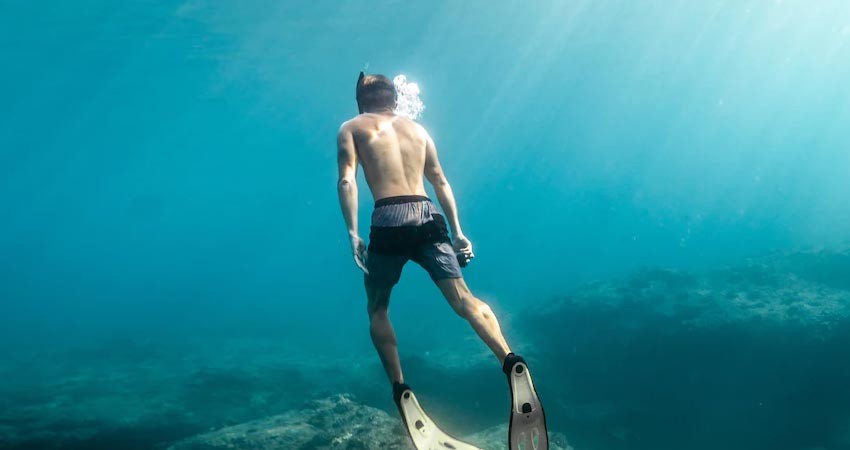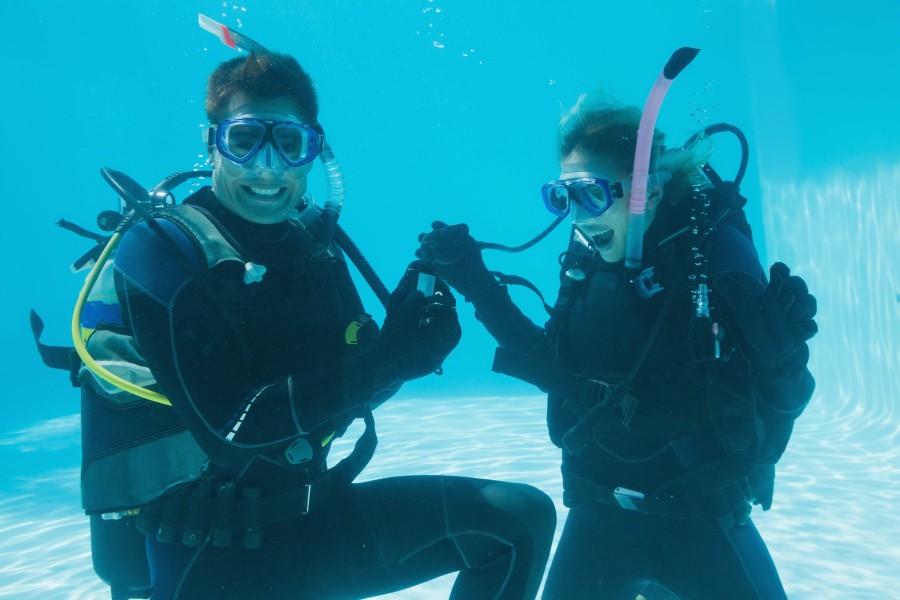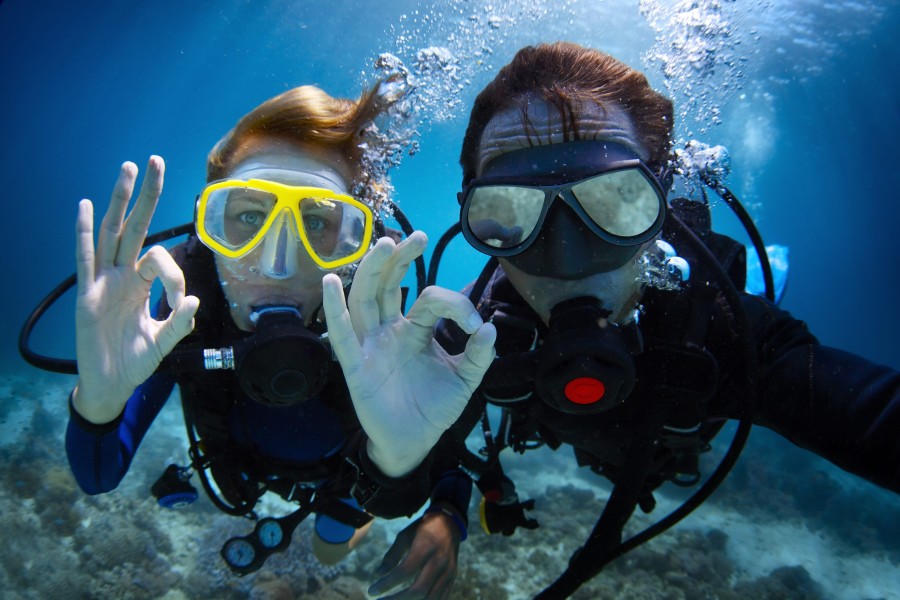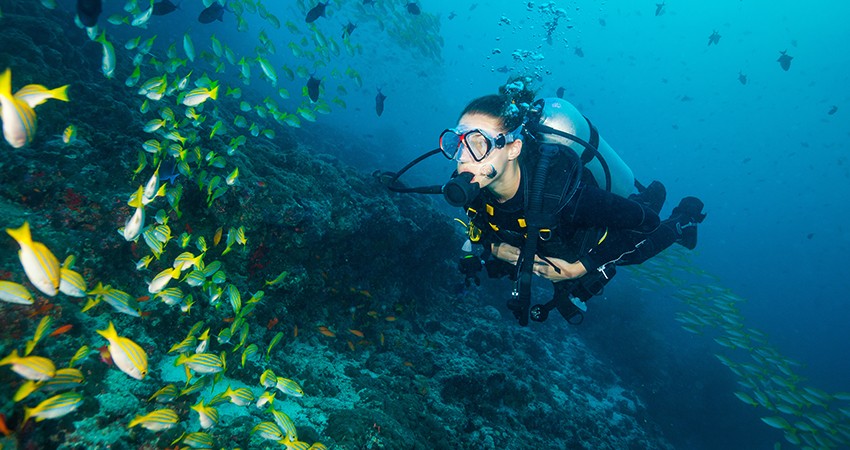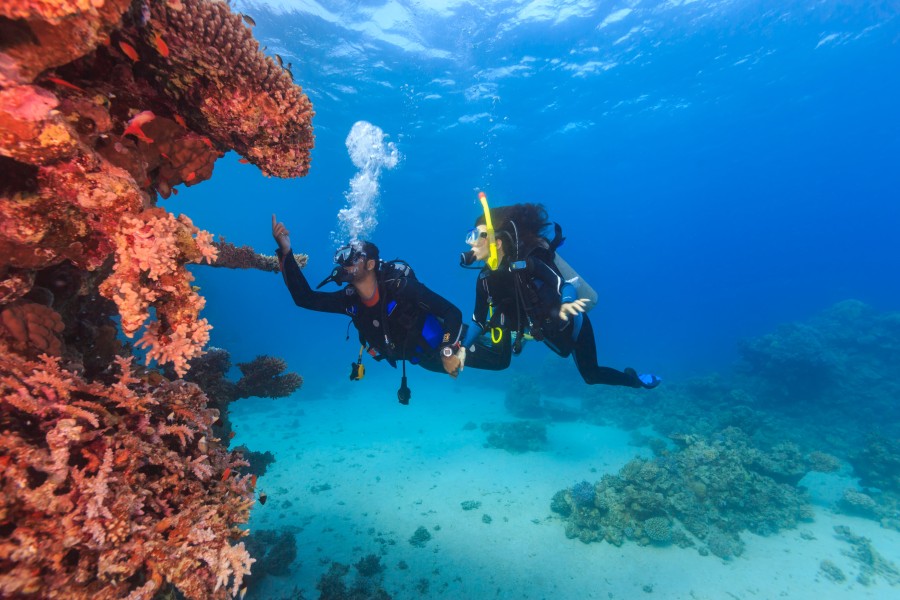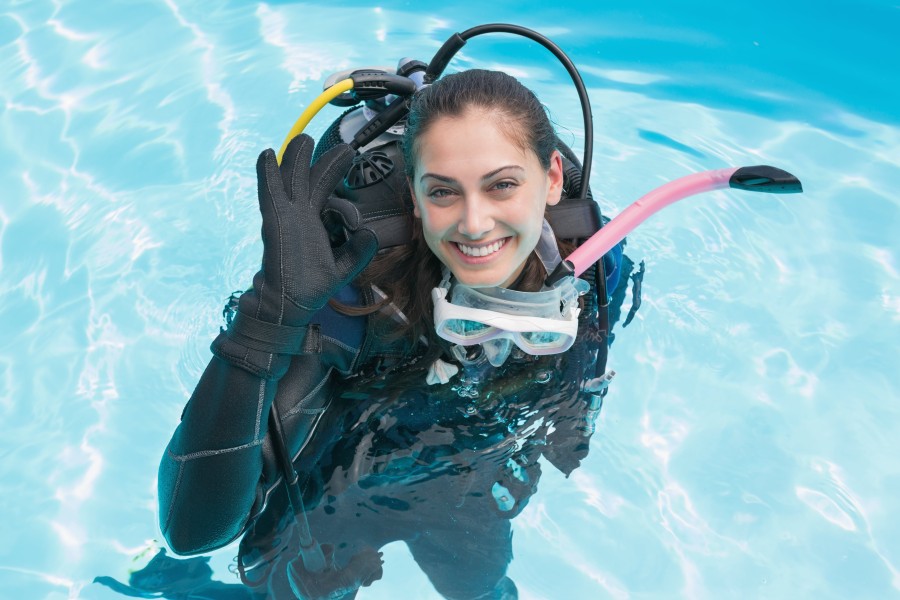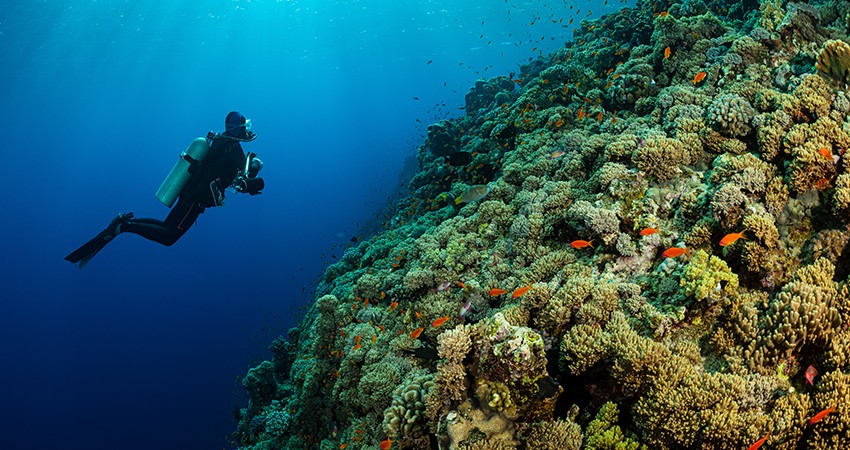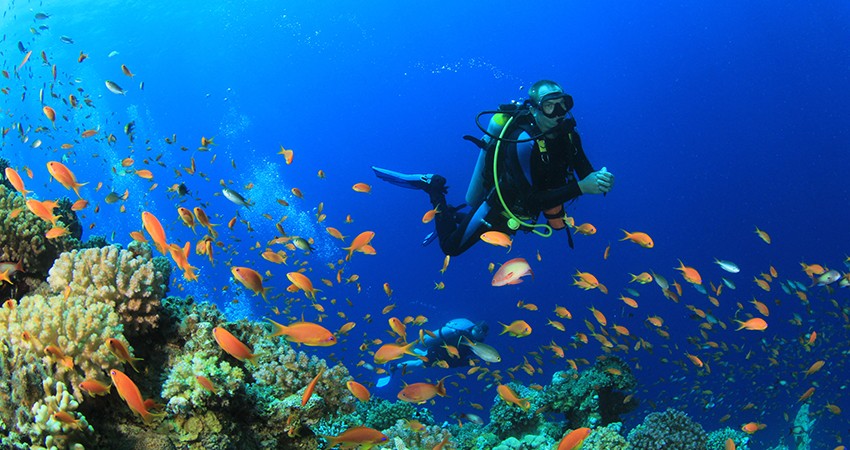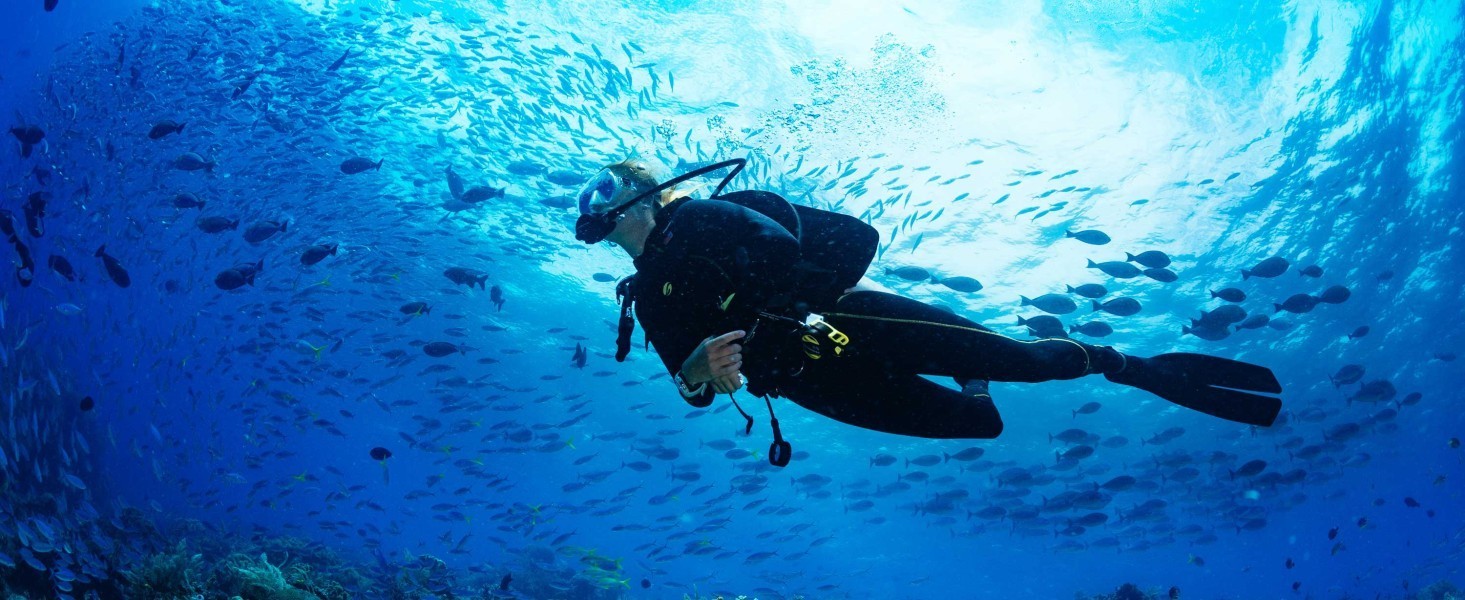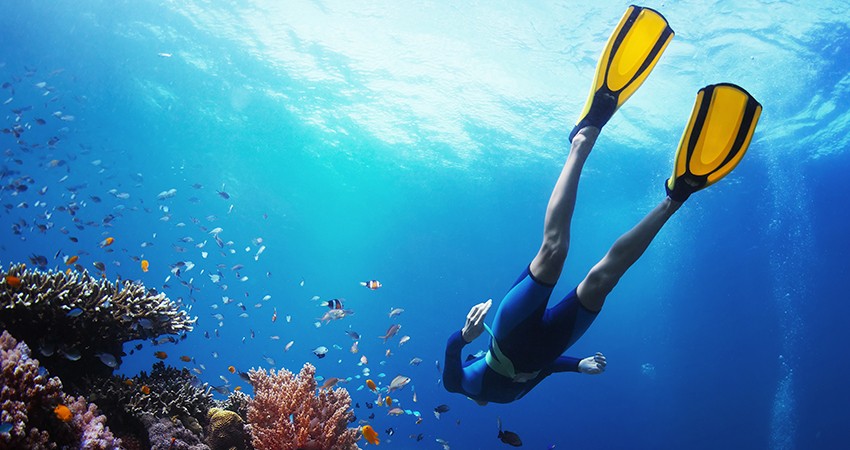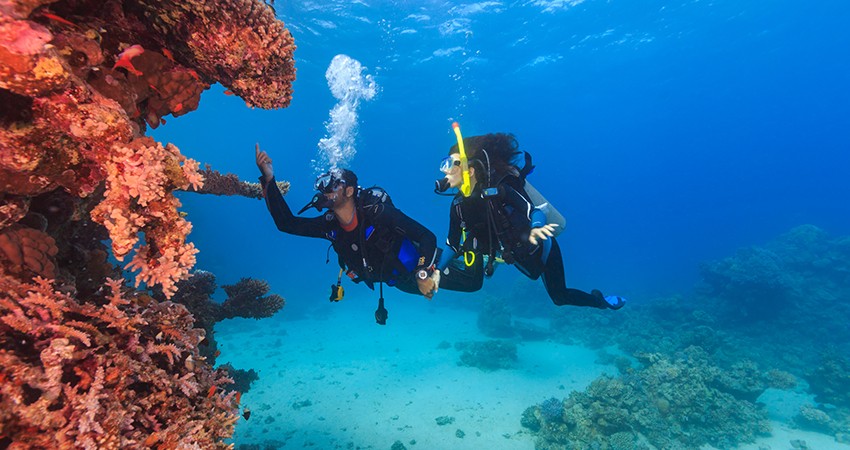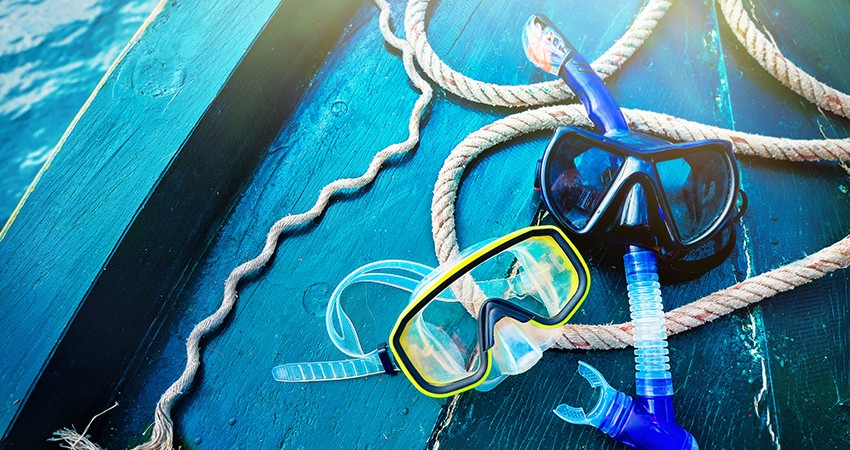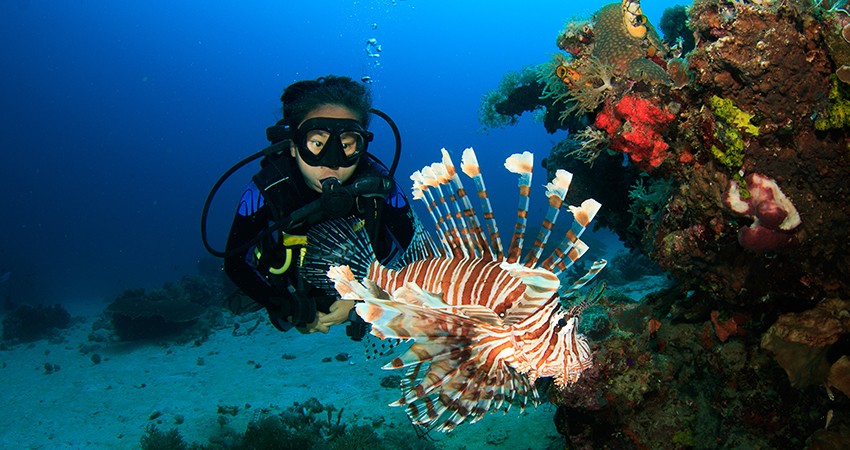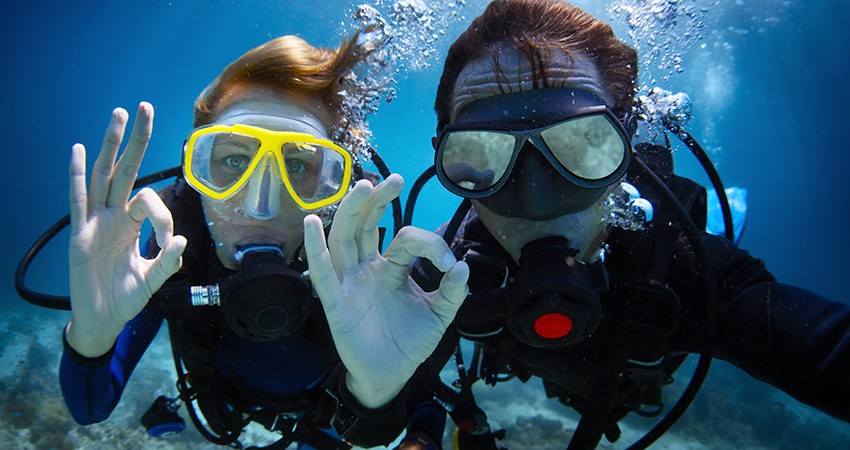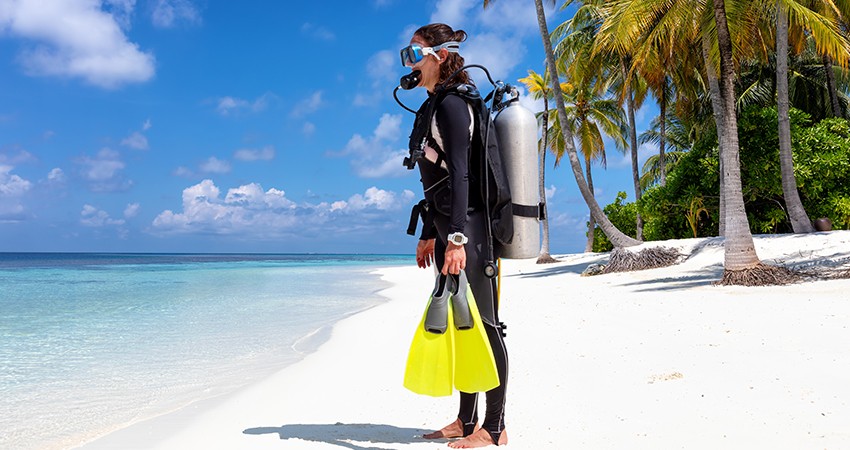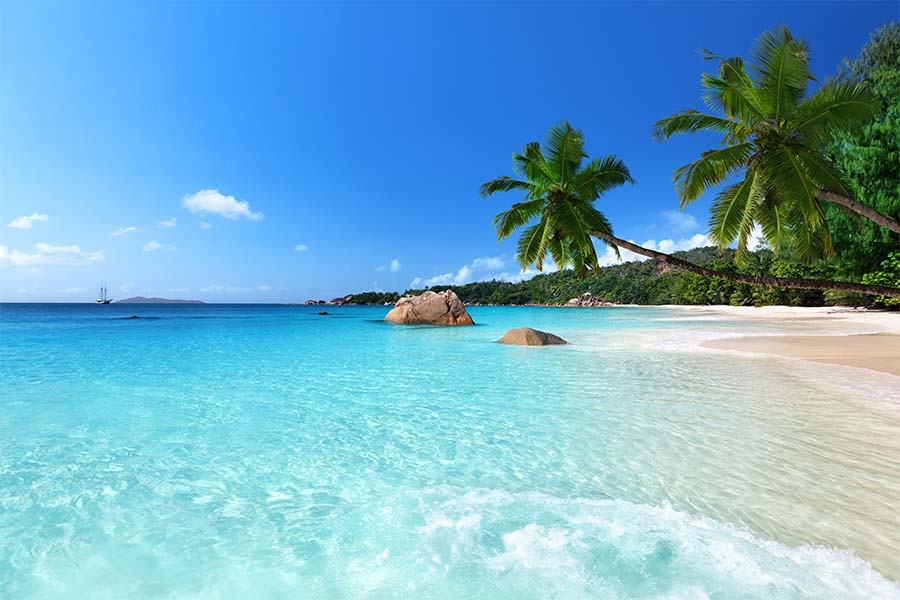Diving Sites in Port Blair



Swimmers
Non-Swimmers
Feel Your
Dive Experience
Dive Experience
Frequently Asked Questions
-
Q. 1 : Which diving courses are offered on Andaman Island?
Answer: On Andaman Island, a wide range of scuba diving courses are provided to everyone from beginners to experienced divers. Some of the most popular courses are listed below from the entry-to-professional level:
- Discover Scuba Diving
- Open Water Diver
- Advanced Open Water Diver
- Rescue Diver
- Dive Master
-
Q. 2 : Can you scuba dive if you don’t know how to swim?
This is perhaps one of the most commonly asked questions by anyone who wants to scuba dive. The short answer is yes, you can scuba dive even if you don’t know how to swim. Here’s a secret: in scuba diving, you do not have to swim. You will be wearing dive fins that will keep you afloat on the surface of the water and help you glide effortlessly under the water. What you do need are proper diving gear like scuba snorkels, scuba mask, scuba buoyancy compensation device that helps you to maintain your buoyancy in the water, dive fins, etc. In addition to this, you’ll have a guide follow you everywhere under the water. The Andaman Islands in India, which is very popular among scuba diving enthusiasts, has many dive centres that train non-swimmers to dive. So, there’s all the lesser reason for you to worry.
-
Q. 3 : What is Discover Scuba Diving?
Answer: A course for beginners, Discover Scuba Diving is created for people who wish to experience the sport without fully committing themselves to a complete certification course. It comprises a small theory session as well as a shallow water dive wherein the individual is accompanied by a certified instructor.
-
Q. 4 : Is there any age limit got scuba diving?
Anyone upwards from the age of 10 can do scuba. However, the training techniques would differ for a child compared to an adult. Also, it is the scuba diving centre that determines if they would allow a child to dive or not. If you have a child who’d like to scuba, contact the scuba diving centre first to ask if they have the facilities for it. Another good news is that there is no upper age limit for scuba diving either. As long as you have a strong respiratory system, you can take that dive.
-
Q. 5 : What is Open Water Diver?
Answer: The Open Water Diver is the most sought-after scuba diving course and is ideally the primary step towards turning into a certified diver. It consists of open water dives, confined water dives, and theory sessions. Overall, it wraps up the basics of scuba diving, such as underwater communication, dive planning, and equipment usage.
-
Q. 6 : Do you need the training to scuba dive?
Yes, you need the training to be able to scuba dive, irrespective of whether or not you know how to swim. Your training for the scuba dive will last no more than 2 hours and you’d be taught a few breathing and gliding tips. You’ll also be informed about the dos and don’ts under the water. To further allay your fears of being underwater, you’ll be accompanied by a trained instructor who will guide you through your exciting journey under the deep blue sea. This training is different from scuba certification courses that last for 2 to 3 days and are only available to trained swimmers.
-
Q. 7 : What is Advanced Open Water Diver?
Answer: Advanced Open Water Diver is the advanced course of scuba diving that enables individuals to explore the deeper depths of diving spots and even more difficult dive sites. The course consists of five adventure dives, including night diving, navigation, and deep diving. Further, it also comprises practical assessments and theory sessions.
-
Q. 8 : How much can scuba diving cost you?
You might that something as exciting and adventurous as scuba diving will cost you a bomb, right? You are wrong. In India, the cost of scuba diving is anywhere between INR 4,500 to 7,000. This includes training, necessary gear, and a guide to follow you under the water. Moreover, there are a lot of diving centres in the Andamans Islands that will offer many packaged services, so with a little more money you can add a few more water sports activities to your scuba diving package. Many resorts and hotels have in-house water sports centres and offer water activities as part of their stay package. If you want to get a scuba certification, depending on the number of days you intend to stay and the number of dives you want to take, the cost can be anywhere between INR 6,500 to INR 20,000. However, you cannot pursue a certification course in scuba if you do not know how to swim.
-
Q. 9 : What is the Rescue Diver course?
Answer: The Rescue Diver is an advanced scuba diving course that teaches divers to identify and handle potential dive crises. The course consists of theory sessions as well as practical exams, comprising simulated rescue situations.
-
Q. 10 : What is the Dive Master course?
Answer: The Dive Master is the highest level of certificate in scuba diving. It consists of theory sessions, practical exams, and a training period with a certified dive instructor. The course teaches divers to become capable of leading and supervising dive operations and to be able to help in scuba diving courses.
-
Q. 11 : Can you dive if you have poor eyesight?
Nothing can stop you from scuba diving, even poor eyesight. However, while you can scuba dive if you wear glasses, you cannot wear your regular prescription glasses underwater. This is because the glasses would interfere with your mask and hinder the view. There are two options for people who wear glasses and plan to scuba dive: you can wear a powered prescription scuba mask (most scuba centres have prescription masks, but it is better to consult with them beforehand) or wear a contact lens. If you do not wear contact lenses regularly you can get some disposable lenses for your dive.
-
Q. 12 : What are the conditions for taking a scuba diving course on Andaman Island?
Answer: The prerequisites for taking a scuba diving course are entirely dependent on the kind of course you opt for. Usually, for Open Water Diver, individuals must be at least 10 years of age and possess basic skills in swimming. In the case of Advanced Open Water Diver, individuals must possess the certification of Open Water Diver or an equivalent. For Rescue Diver, participants must have a certification in Advanced Open Water Diver and must have finished a CPR and a first aid course within the last 24 months.
-
Q. 13 : How much time can you spend underwater while scuba diving?
On average, it takes around 30-60 minutes for a dive. Of course, you can request your diver to take you up early in case you feel like it. The cost of the dive can also move up and down depending on how much time you want to spend underwater. Most dives last for 45 minutes.
-
Q. 14 : Are there any medical conditions that might hinder your scuba diving plans?
While scuba diving is open to most people, you may have difficulty diving and staying underwater if you have severe respiratory problems. Usually, people with asthma and heart patients are not recommended to go scuba diving. It is also risky for pregnant women to go scuba diving. If you have any ear-related issues, that may also hinder your scuba diving plans. The best thing to do here is to consult a doctor to see if your current condition allows you to scuba dive.
-
Q. 15 : What is the duration of scuba diving courses on Andaman Island?
Answer: The duration of a scuba diving course is based on the level and the operator chosen by the individual. The typical duration for these is as follows.
- Discover Scuba Diving: 1 day
- Open Water Diver: 3-4 days
- Advanced Open Water Diver: 2-3 days
- Rescue Diver: 2-3 days
- Dive Master: 4 weeks
-
Q. 16 : What is the cost of a scuba diving course on Andaman Island?
Answer: Like other factors, the price of a scuba diving course is also dependent on the course and operator you choose. The usual prices for each course are given below.
- Discover Scuba Diving: INR 4,000 to INR 6,000
- Open Water Diver: INR 18,000 to INR 30,000
- Advanced Open Water Diver: INR 20,000 to INR 35,000
- Rescue Diver: INR 20,000 to INR 35,000
- Dive Master: up to INR 1,00,000
-
Q. 17 : Is scuba diving the same as snorkelling?
While, both snorkelling and scuba diving are similar underwater activities, they are not the same. You do not have to dive deep into the water while snorkelling. You get to stay close to the surface of the water and can get a panoramic view of the underwater world. In scuba, you need to dive deep inside the water can immerse yourself in the beauty of the water world.
-
Q. 18 : What is the minimum age requirement for taking a scuba diving course on Andaman Island?
Answer: The minimum age requirement to be able to participate in each scuba diving course is as follows.
- Discover Scuba Diving: 10 years
- Open Water Diver: 10 years
- Advanced Open Water Diver: 12 years
- Rescue Diver: 12 years
- Dive Master: 18 years
-
Q. 19 : What are the best scuba diving spots in the world for non-swimmers?
Many famous scuba diving spots across the world attract a lot of divers. In India, the Andaman Islands are very popular for scuba diving activities. Lighthouse, Barracuda city, Bala Reef, and Aquarium are some of the best spots for scuba diving in the Andaman Islands. Outside of India, Bali, Thailand, Belize, Maldives, and the great barrier reef in Australia, are some of the top spots in the world for scuba diving.
-
Q. 20 : What are the physical necessities for taking a scuba diving course on Andaman Island?
Being a water sport, scuba diving requires an individual to be physically fit. Thus, participants are required to meet certain criteria in order to be eligible for applying for a scuba diving course. They must be capable of carrying scuba diving equipment, have basic swimming skills, and must be in good health. Further, participants with medical conditions like heart disease and asthma will be required to get medical clearance from a physician prior to partaking in a scuba diving course.
-
Q. 21 : What is the key difference between SSI and PADI scuba diving courses?
SSI and PADI are among the two greatest scuba diving certification agencies across the globe. Both PADI and SSI provide scuba diving courses. However, there are certain key differences in their course requirements and certification processes. On Andaman Island, PADI courses are more famous. Nonetheless, both SSI and PADI certifications are internationally recognized.
-
Q. 22 : How many dives does each scuba diving course on Andaman Island include?
Answer: Each course level includes a varying number of scuba dives:
- Discover Scuba Diving: 1 shallow water dive
- Open Water Diver: 4 open water dives
- Advanced Open Water Diver: 5 adventure dives
- Rescue Diver: 2 confined water and 2 open water dives
- Dive Master: at least 60 dives in various diving conditions
-
Q. 23 : What is the ratio of instructors to participants when it comes to a scuba diving course on Andaman Island?
Answer: The ratio of instructor to participant varies based on the scuba diving operator and course level. However, the typical ratio for each course level is:
- Discover Scuba Diving: 1 instructor to 2 participants
- Open Water Diver: 1 instructor to 4 participants
- Advanced Open Water Diver: 1 instructor to 6 participants
- Rescue Diver: 1 instructor to 6 participants
- Dive Master: 1 instructor to 4 or 6 participants
-
Q. 24 : Can you take a scuba diving course on Andaman Island if you wear contact lenses or glasses?
Answer: Yes, you can take a course in scuba diving on Andaman Island if you wear contact lenses or glasses.
-
Q. 25 : Who is eligible to dive?
To go scuba diving, one needs to be aged 10 years and older and must have a reasonable physical fitness level. One should be comfortable in the water and have a sense of adventure.
-
Q. 26 : Is there an upper age limit for scuba divers?
Fortunately, there is no upper age limit for learning to scuba dive. However, certain conditions may stop you from diving either temporarily or permanently such as conditions associated with lung functions. It is never too late to learn scuba diving as long as you have good physical and mental conditioning. Many divers don’t stop in their 70s even!
-
Q. 27 : Is learning to scuba dive tough?
Not at all! Scuba diving is easier than you imagine, especially if you are already familiar with being in the water. Pool diving, knowledge development, and open-water dives are included in PADI’s entry-level course. It is based on performance which means that you will progress as you learn and show knowledge and skills.
-
Q. 28 : How long does it take to become a certified scuba diver?
Courses by PADI are performance-based. It means that you will only earn your certification when you have demonstrated that you have mastered the required knowledge & skills. The duration of the course varies because some people learn faster than others. The most popular PADI course, the Open Water Diver course, can be done in only 3 days!
-
Q. 29 : How old should I be to become a certified diver?
One must be at least 10 years old to earn a Junior Open Water Diver Certification. 10 and 11-year-old Junior Open Water Divers are required to dive with a certified parent, guardian, or PADI Professional. The maximum depth that they can go to is 12 meters/40 feet. 12 to 14-year-olds must dive with a certified adult. The junior certification upgrades to a regular Open Water Diver certification at age 15.
-
Q. 30 : How can I find the best scuba gear for myself?
It’s quite easy to find the best gear for yourself. The dive professionals at PADI dive shops will help you in finding scuba gear that matches your preferences, fit, and budget perfectly.
-
Q. 31 : Do I have to be a good swimmer to scuba dive?
One should have a basic level of swimming ability and skills. You should be able to maintain yourself in the water. To assess this, your instructor will ask you to do the following:
- Swim 200 metres/yards (or 300 metres/yards in mask, fins, and snorkel). You are free to use any swimming strokes you wish. Also, there is no time limit.
- Using any method you want, float and tread water for 10 minutes.
If you meet the performance requirements of the course, then you are qualified for certification.
-
Q. 32 : What should you expect during the practical component of the PADI Open Water Diver course?
During the practical component of the PADI Open Water Diver course, you will participate in several confined water sessions and four open water dives. In the confined water sessions, you will practice and master basic scuba diving skills in a controlled and safe environment. In the open water dives, you will apply the skills you learned in the confined water sessions in a real-world diving environment.
-
Q. 33 : What happens if you fail the PADI Open Water Diver course?
If you do not successfully complete the PADI Open Water Diver course, you will have the opportunity to retake the course or specific components of the course until you meet the requirements for certification. Additional fees may apply for retaking the course or components of the course.
-
Q. 34 : What exactly is the PADI Open Water Diver certification?
The PADI Open Water Diver certification is an entry-level scuba diving certification that authorizes you to dive with a certified dive buddy at a maximum depth of 18 meters (60 feet). It is a widely recognized scuba diving certification worldwide and is considered the most popular in the industry.
-
Q. 35 : What is the PADI Deep Diver Course?
The PADI Deep Diver Course in Andaman is similar to the course offered in other locations. It is designed to provide divers with the necessary skills and knowledge to safely dive deeper into underwater environments in the Andaman Islands, which are known for their diverse marine life and unique underwater topography. The course typically includes four open water dives and classroom sessions, covering topics such as deep diving equipment, gas management, physiological effects of deep diving, and emergency procedures. The course is taught by certified PADI instructors, who ensure that the participants receive the best possible training and guidance.
-
Q. 36 : What are the prerequisites for the PADI Deep Diver Course?
To enrol in the PADI Deep Diver Course in Andaman, you must meet the following prerequisites: you must be at least 15 years old, have a PADI Adventure Diver certification or equivalent, and have completed the PADI Enriched Air Diver course or have a certification for nitrox diving from another recognized training organization. These requirements ensure that you have the necessary knowledge and skills to safely and confidently plan and execute deep dives. It is important to note that if you have a medical condition, you may need to obtain clearance from a physician before starting the course.
-
Q. 37 : What is covered in the PADI Advanced Open Water Course?
The PADI Advanced Open Water Course covers a wide array of knowledge and skills associated with diving. The necessary Deep Dive is concentrated on deep diving techniques, such as proper buoyancy control, emergency decompression procedures, and nitrogen narcosis management. The Underwater Navigation Dive includes navigation techniques, like natural navigation and the use of a compass. The elective dives can comprise topics like search and recovery, peak performance buoyancy, drift diving, wreck diving, and night diving. The course further consists of knowledge development on dive safety, dive planning, and dive theory.
-
Q. 38 : Can one complete their PADI Advanced Open Water Course via e-Learning?
Yes, PADI provides PADI Advanced Open Water Course through eLearning, which enables individuals to finish their knowledge development part of the course online at their own pace. Individuals are still required to take the five adventure dives under the guidance of a certified PADI instructor at a resort or dive centre. The choice of opting for eLearning can be a flexible and convenient option for completing the course, particularly if one has a limited period of time or wishes to get over with their knowledge development part prior to their arrival on the dive spot.
-
Q. 39 : Do you have to carry your own scuba diving equipment for taking the PADI Advanced Open Water Course?
Although it is highly recommended that you carry your own scuba diving equipment for familiarity and comfort, it is not compulsory for you to bring your equipment to take the course. A majority of resorts and dive centres provide the students with rental equipment, encompassing tanks, regulators, masks, fins, and wetsuits. Nonetheless, it is crucial to ensure the equipment fits you right and is in an acceptable condition ahead of using it. If you ask us, we would suggest you think about buying your own fins, snorkel, and mask for better comfort and proper fitting.
-
Q. 40 : What is Discover Scuba Diving (DSD)?
Answer: Discover Scuba Diving (DSD) is an introductory diving program created by the Professional Association of Diving Instructors (PADI), one of the world's leading scuba diving training organisations. This program is designed to introduce the joy and thrill of scuba diving to people who have no prior diving experience or certification.
DSD is not a certification course but an experience; it's akin to taking a sneak peek into the enchanting underwater world, without the commitment of a full certification course. It provides beginners with a safe, guided introduction to scuba diving, focusing on teaching them the basics and allowing them to comfortably experience the wonders beneath the waves.
-
Q. 41 : Who can participate in Discover Scuba Diving (DSD)?
Answer: Anyone over the age of 10 who is in reasonably good health, comfortable in the water, and not suffering from a serious medical condition can participate in DSD. While no prior experience with scuba diving is required, basic swimming skills are recommended.
-
Q. 42 : What does the Discover Scuba Diving (DSD) program include?
Answer: The DSD program is a well-structured and carefully curated experience designed to provide a taste of what scuba diving entails. It generally consists of three main components, giving participants a wholesome introduction to the world of diving.
Knowledge Development: This is the first part of the program, where you will participate in an interactive orientation session. A PADI professional will cover the basics of scuba diving, diving safety, and fundamental diving principles. This part of the program is designed to familiarize you with the essential rules and techniques of scuba diving, ensuring you're well-informed before you take the plunge.
Confined Water Dives: After gaining an understanding of the theory, you will move on to the practical part of the program. In a pool or confined water site, you will learn and practice key diving skills under the guidance of a PADI professional. This includes becoming familiar with diving gear, learning how to manage buoyancy, practising breathing underwater, and understanding how to communicate through diving signals. This controlled environment allows you to build confidence and get comfortable with the equipment before heading to the open water.
Open Water Dives: This is undoubtedly the highlight of the DSD program. With the basic skills under your belt, you'll embark on an actual dive in open water. Under the direct supervision of a PADI professional, you will explore the underwater world, descending to a maximum depth of 12 meters/40 feet. This is where you get to truly experience the magic of diving, observing marine life up close and enjoying the unique sensation of moving effortlessly through the water.
-
Q. 43 : Do I need to be a strong swimmer to participate in Discover Scuba Diving (DSD)?
Answer: While being a strong swimmer can certainly help boost your confidence underwater, it's not a necessity. As long as you're comfortable in the water and can tread or float, you're good to go. Remember, the DSD experience is more about a gentle exploration than an athletic endeavour.
-
Q. 44 : Is scuba diving dangerous?
Answer: Like any sport, scuba diving does carry inherent risks, primarily when safety procedures are ignored. However, DSD is carried out under the direct supervision of PADI professionals who prioritize safety above all. They'll ensure you understand all necessary safety protocols before your dive.
-
Q. 45 : What equipment will I need for Discover Scuba Diving (DSD)?
Answer: All necessary diving equipment, including a mask, snorkel, fins, regulator, buoyancy control device, dive gauges, and a tank will be provided by the diving centre. It's always essential, though, to invest in a good-quality, well-fitting mask and snorkel for your comfort and safety.
-
Q. 46 : What will I see during my Discover Scuba Diving (DSD) experience?
Answer: That entirely depends on your diving location. You could see anything from vibrant coral reefs to fascinating marine life, including fish, turtles, and maybe even dolphins. Every dive offers a unique adventure.
Vibrant Coral Reefs: Coral reefs are the bustling metropolises of the sea, providing homes and feeding grounds for a huge variety of marine species. From soft corals waving in the current, to colourful, hard coral structures, the sight of a thriving reef is one you'll remember forever.
Incredible Marine Life: From tiny, colourful reef fish to larger pelagic creatures, the ocean is filled with an array of marine life. You might see schools of fish swirling in hypnotic unison, watch a graceful turtle glide by, or even witness the curious behaviour of an octopus. Each dive location houses different species, adding an element of surprise and excitement to each dive.
-
Q. 47 : What if I feel nervous or claustrophobic?
Answer: It's natural to feel nervous before your first dive. PADI professionals are trained to handle such situations and will help you relax. Remember, you'll never be rushed or pressured into diving. If you feel claustrophobic, speak about it with your instructor. They can provide additional training and reassurance.
-
Q. 48 : How long does a Discover Scuba Diving (DSD) experience last?
Answer: Typically, a DSD experience lasts between 2 to 3 hours, including theoretical instruction, equipment familiarization, and the dive itself. However, the actual time may vary depending on the individual's comfort level and the diving centre.
-
Q. 49 : What certifications can get after my DSD experience?
Answer: After completing your Discover Scuba Diving (DSD) experience, if you've been bitten by the diving bug and wish to explore further, there are several certification courses you can undertake. These courses are designed to enhance your diving skills and allow you to dive independently. Here are a few of them:
PADI Open Water Diver (OWD): This is the most basic and also the most popular scuba diving certification course. The Open Water Diver course equips you with the necessary skills and knowledge to dive independently with a buddy to a maximum depth of 18 meters/60 feet. The course typically includes knowledge development, confined water dives, and open water dives.
PADI Advanced Open Water Diver (AOWD): Once you're comfortable with the OWD skills, you may wish to explore different diving activities and dive to greater depths. The AOWD course offers this opportunity. This course includes five different adventure dives, including deep and navigation dives, plus three others that you can choose based on your interests. After completion, you can dive up to a depth of 30 meters/100 feet.
PADI Rescue Diver: For divers who wish to take their skills to another level, the PADI Rescue Diver course is an excellent choice. This course teaches you how to manage more complex dive emergencies and how to perform diver assists and rescues. It's a challenging yet rewarding course that builds confidence and equips you with valuable skills.
PADI Divemaster: If you're thinking of turning your passion into a profession, then becoming a PADI Divemaster might be your next step. As a Divemaster, you'll be a leader who mentors and motivates others. You’ll gain dive knowledge, supervision abilities, and become a role model to divers around the world.
Apart from these, there are many PADI Specialty Courses you can pursue based on your interests, such as Wreck Diving, Night Diving, Underwater Photography, Enriched Air Diver (Nitrox), and many more. Each specialty allows you to focus on a particular aspect of diving and further enhance your skills and knowledge in that area.
-
Q. 50 : How can I book a Discover Scuba Diving (DSD) experience?
Answer: You can book a DSD experience through a local PADI Dive Shop or Resort. Many diving centres in the Andamans offer this program, so it's worth researching online and checking reviews before making your choice.
-
Q. 51 : What is the cost of the Discover Scuba Diving (DSD) course in the Andaman Islands?
Answer: The cost of the Discover Scuba Diving (DSD) program in the Andaman Islands can vary based on the diving centre and the specific details of the program. The price generally ranges from INR 3500 to INR 5000 per person.
This cost typically includes basic scuba instruction, equipment rental, the guidance of a PADI professional, and one dive in the ocean. However, prices may have changed, and certain extras like underwater photography, transportation, food, or additional dives might incur additional costs. -
Q. 52 : Any health concerns I need to be aware of before diving?
Answer: Scuba diving involves breathing compressed air, which can exacerbate conditions like asthma, chronic bronchitis, or other chronic obstructive airway diseases. You should consult your doctor before signing up for the DSD course to ensure that you are not risking your health while diving. Pregnant women and people with a history of heart disease, stroke, or heart attack should be particularly cautious.
Additionally, certain medications and the use of substances like alcohol or illicit drugs can also influence an individual's fitness to dive. Before your DSD experience, you will typically be asked to complete a standard medical questionnaire to identify any potential issues.
-
Q. 53 : Can I wear prescription glasses while diving?
Answer: Wearing standard eyeglasses while scuba diving isn't practical or comfortable, primarily due to the design of the dive mask and the need for a good seal against your face to prevent water from entering the mask. You can wear prescription dive masks or contacts while diving to help with this issue. Many divers opt to wear soft contact lenses while diving. Soft contact lenses are generally considered safe to use during diving.
-
Q. 54 : What can you explore while scuba diving?
Scuba diving lets you go places you have never been before. Explore the underwater world. Swim with massive shoals of colourful fish, and most importantly, witness the beauty of the incredible coral reefs. In some places, you can also swim with sharks and manta rays. Isn’t that just great?
Diving Sites in Port Blair
Diving Sites in Havelock Island
Diving Sites in Neil Island
